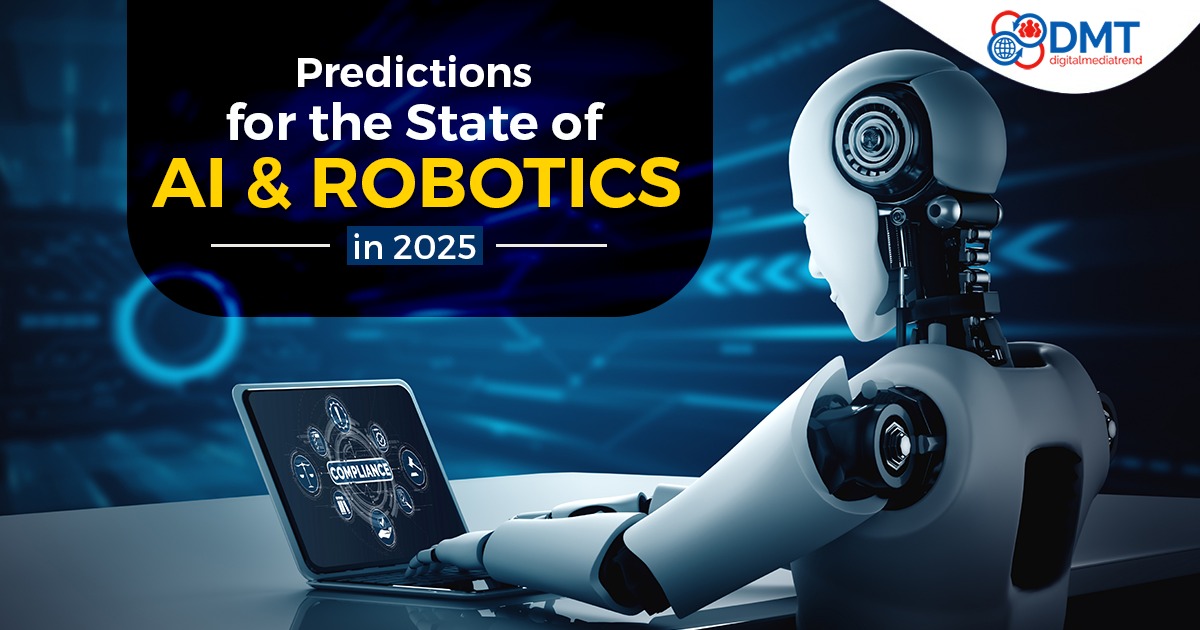As we approach 2025, the fields of Artificial Intelligence (AI) and Robotics are set to undergo significant advancements, transforming various aspects of our lives. Here are some key predictions for the state of AI and robotics in 2025:

- Integration into Daily Life
AI and robotics will become deeply integrated into our daily lives, enhancing convenience and efficiency. Smart homes will feature more advanced AI-driven systems for energy management, security, and personal assistance. Household robots will handle routine tasks such as cleaning, cooking, and maintenance, freeing up time for individuals to focus on more meaningful activities.
- Advancements in Healthcare
The healthcare sector will see significant benefits from AI and robotics. AI algorithms will improve diagnostics, predict patient outcomes, and personalize treatment plans. Robotic surgeons will perform complex surgeries with greater precision, reducing recovery times and improving patient outcomes. Additionally, AI-powered wearable devices will monitor health in real-time, providing early detection of potential issues.
- Autonomous Vehicles
By 2025, autonomous vehicles are expected to become more common on the roads. AI-driven cars, trucks, and drones will enhance transportation efficiency, reduce accidents, and lower emissions. These vehicles will be capable of navigating complex urban environments and making real-time decisions based on a vast array of data inputs.
- AI in Education
AI will play a pivotal role in transforming education. Personalized learning platforms will adapt to the needs and pace of individual students, providing customized resources and feedback. AI-driven tutors and teaching assistants will help address gaps in learning and support educators in managing classroom activities. Virtual reality (VR) and augmented reality (AR) powered by AI will offer immersive learning experiences.
- Industrial Automation
The manufacturing and logistics sectors will experience further automation with AI and robotics. Smart factories will use AI to optimize production processes, predict maintenance needs, and manage supply chains more efficiently. Collaborative robots (cobots) will work alongside human workers, enhancing productivity and ensuring safety.
- AI in Finance
AI will continue to revolutionize the finance industry. Algorithms will handle tasks such as fraud detection, risk assessment, and investment management with increased accuracy and speed. AI-powered chatbots will provide personalized financial advice and support, improving customer service and engagement.
- Enhanced Cybersecurity
AI will play a crucial role in enhancing cybersecurity. AI systems will detect and respond to threats in real-time, identifying patterns and anomalies that could indicate a cyber attack. Machine learning algorithms will continuously improve their understanding of new threats, making systems more resilient and secure.
- Natural Language Processing and Communication
Natural Language Processing (NLP) technologies will advance, enabling more natural and intuitive interactions between humans and machines. AI-driven virtual assistants will understand and respond to complex commands, providing more useful and contextually relevant information. This will enhance communication and accessibility across various applications.
- Ethical and Regulatory Developments
As AI and robotics become more pervasive, there will be a stronger focus on ethical considerations and regulatory frameworks. Governments and organizations will work towards establishing guidelines to ensure the responsible use of AI, addressing issues such as bias, privacy, and job displacement. Ethical AI practices will become a standard part of AI development and deployment.
- Continued Research and Innovation
The field of AI and robotics will continue to be a major area of research and innovation. Breakthroughs in areas such as quantum computing, neuromorphic engineering, and advanced machine learning techniques will push the boundaries of what AI and robots can achieve. This ongoing research will drive new applications and capabilities, further transforming industries and society.
By 2025, AI and robotics will have a profound impact on various aspects of our lives, from healthcare and education to transportation and industry. These technologies will enhance efficiency, improve quality of life, and open up new opportunities for innovation. However, it will also be crucial to address ethical, regulatory, and social challenges to ensure that the benefits of AI and robotics are realized in a responsible and equitable manner.

